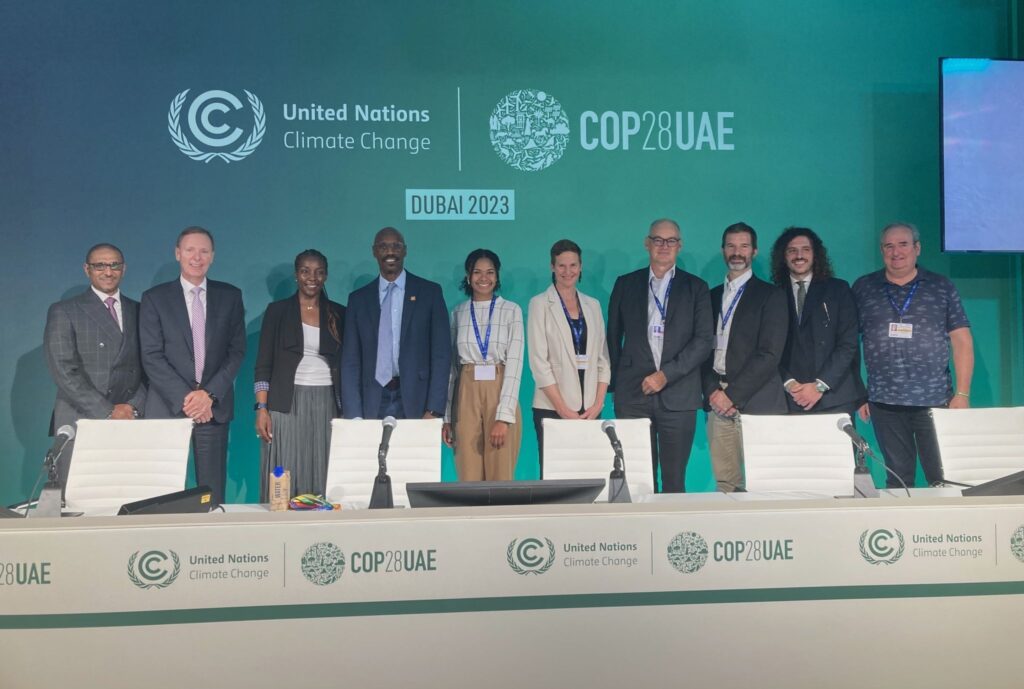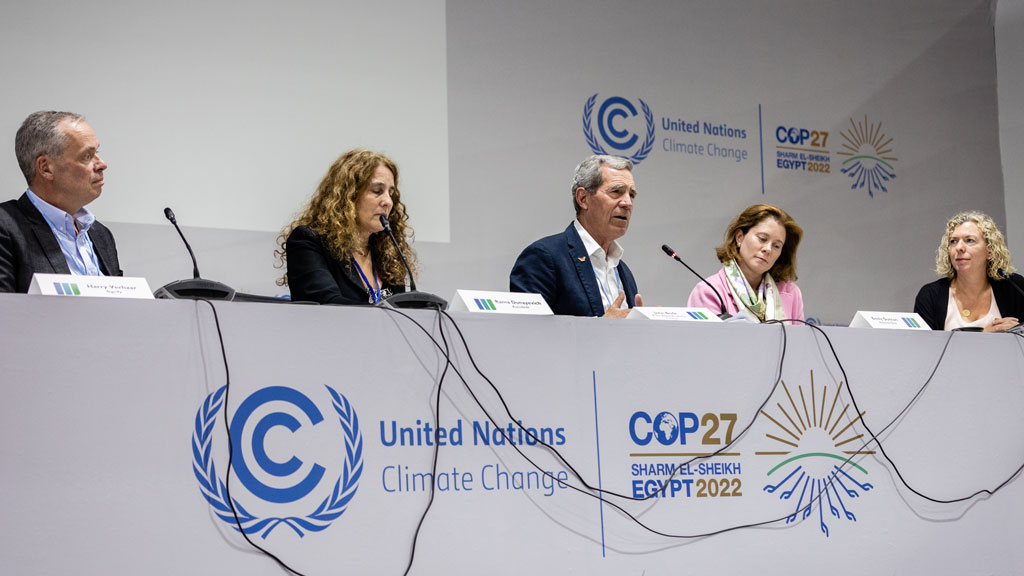2024 UN Climate Change Conference (COP29)
PBPC maintained its active role in global climate conversations at COP29 in Baku, Azerbaijan. Executive Director James Glueck and Senior Director of Sustainability and Environmental Affairs Jamaica Gayle were in attendance and participated in a pair of important discussions on the intersection of climate policy and agriculture.

Glueck joined a panel hosted by the Inter-American Institute for Cooperation on Agriculture (IICA) including value chain perspectives on the circular bioeconomy. The discussion explored how the development of a circular bioeconomy can reduce waste, create new jobs, and contribute to sustainable development goals.

Gayle participated in a panel organized by the Biotechnology Innovation Organization, exploring how technology and innovation are driving sustainability in agriculture. The panel also featured insights from representatives of the International Fresh Produce Association and CropLife Brazil.

Glueck and Gayle joined a UNFCCC side event co-organized by PBPC, the Corn Refiners Association, the International Council for Sustainable Energy (ICSE), and the Alliance to Save Energy that discussed how building a circular economy and adopting a holistic systems approach that embraces innovative materials and partnerships can achieve long-term and sustainable success in meeting climate goals and improve local communities.

PBPC also highlighted the critical role of plant-based products in climate change mitigation at an exhibit booth that showcased important information during the first week of the event.
For the second consecutive year, COP hosted a dedicated day on agriculture, titled “Food, Agriculture, and Water,” underscoring the importance of agriculture in climate action. On the day, the Presidency and the FAO launched the Baku Harmoniya Climate Initiative for Farmers to provide a platform for identifying gaps and opportunities in policymaking, while empowering farmers, villages, and rural communities. AIM for Climate, a global initiative supported by the United States and the United Arab Emirates, also hosted its third Ministerial, further advancing the conversation on climate-smart agricultural solutions through international collaboration and investment.
The foundations laid at COP29 will lead to further discussion at COP30, which will take place Nov. 10-21, 2025 in Belém, Brazil.
2023 UN Climate Change Conference (COP28)
PBPC joined the UN Climate Change Conference of the Parties in 2023 (COP28), to highlight the part the agriculture bioeconomy has in addressing the adverse impacts of climate change, facilitating the transition toward renewable energy sources, integrating solutions for sustainable agriculture, and protecting, conserving, and restoring nature and ecosystems. COP28 was the first time that “Food & Ag” had a dedicated day in the thematic program, and the conference facilitated a series of outcomes at the intersection of climate change, food and agricultural production systems, and food and nutrition security. Another important outcome was a commitment to transition the world’s energy systems away from fossil fuels. Plant-based products are well-positioned to play an important role in this transition.
PBPC’s Director of Sustainability & Environmental Affairs, Jamaica Gayle, joined speakers and members from Cargill, Mars, European Business Council for Sustainable Energy, and Trane Technologies to explore how building a circular economy will ensure the long-term success of both the energy transition and decarbonizing our economies.

More than 150 countries endorsed the UAE Declaration on Sustainable Agriculture, Resilient Food Systems, And Climate Action, committing to including agricultural emissions in their next round of climate targets, taking place in 2025. This declaration highlights the significant role of agricultural and food systems in offering innovative responses to climate change and the importance of engaging in the discussion.
The next conference (COP29) will be held in Baku, Azerbaijan.
2022 UN Climate Change Conference (COP27)
PBPC joined the UN Climate Change Conference of the Parties in 2022 (COP27), to elevate the role plant-based products and a circular economy can play in addressing climate change. Plant-based products are crucial to reducing our reliance on fossil fuels in order to make so many of the products we rely on every day. COP27 was held Nov. 6-18, 2022, in Sharm el Sheikh, Egypt, where world leaders convened to take action towards the climate goals of the Paris Agreement and the UN Framework Convention on Climate Change. PBPC partnered with allied organizations, including the Business Council for Sustainable Energy (BCSE), to host a virtual exhibit and side event to bring PBPC’s message to this international community.

PBPC Board Member, John Bode, participated in a discussion on Integrating Across Sectors: Business Leaders in Energy, Buildings, & Circular Economy. Watch the video below to learn more.
2021 UN Climate Change Conference (COP26)
The 2021 UN Climate Change Conference (COP26) focused on reaching the goals of the UN Framework Convention on Climate Change and the Paris Agreement. During the meeting, PBPC partnered with allied organizations, including BCSE and US Green Building Council, to host a virtual exhibit and side event where we highlighted the role of plant-based products and a circular economy in addressing climate change.
Watch PBPC Executive Director, Jessica Bowman, as she discussed how plant-based products support a “net-zero” future with BCSE President, Lisa Jacobson.
View the side event: “Powering Forward in the Critical Decade: Business Leaders in Energy, Building & Circular Economy” below.
How Plant-Based Products Can Help Address Goals from the UN Climate Change Conference (COP26)

